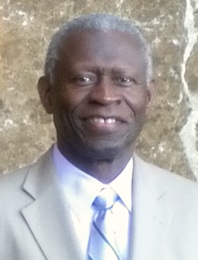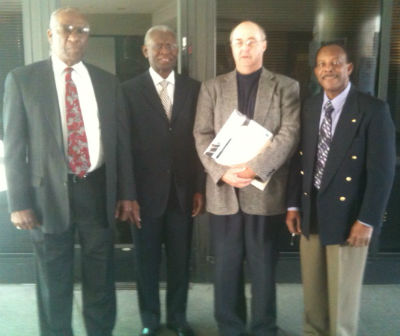
By Neil Earle

Pasadena, CA – Erect, fatherly and confident, Dr. Lawrence Carter of Morehouse College addressed some 400 students and faculty at Fuller Seminary’s annual commemoration of Martin Luther King Day on January 18. It came in the middle of an “MLK Summit” on how King’s themes and messages apply in today’s world.
Dr. Carter is a veteran academic as well as an ordained Baptist minster. As a tenth grader he was personally recruited to attend Morehead by Dr. King himself. Carter left no doubt as to where the fiery civil rights leader would stand on the grass roots discontent presently gripping America and the world. “The grievance package is familiar,” Dr. Carter intoned, “the well-connected rich getting richer and the resultant anger, inequality, poverty and unemployment.”
There has been a massive bank bailout yet no money to support people with unpayable mortgages, he continued. “Four hundred Americans have as much wealth as one-half the population,” charged Dr. Carter, “the slogan ‘people first and not property’ is not popular today.” We are murdering prisoners where serious doubt is evident and mired in what an American historian calls “a militarized foreign policy.”
Inequality has given us a “sham democracy” where 27 million voters are in jeopardy of losing their ballot in November, Carter charged. In such a world, he believes, it is time to revisit Martin Luther King’s ethical vision of where he saw the world must go, towards what Dr. Carter summarized as the “Global Promised Land,” referencing King’s last speech where he quoted “I have seen the promised land.” The last few years of his life King extended his vision of the future to include the world, Dr. Carter believes. “His definition of the chosen people has been ignored since his death. He preached universalism, justice for all, affirming the worth of all persons and not elevating difference to the level of a cult.”

Especially by the end of his life, Dr. King never limited his vision to race, Dr. Carter reminded us. “He saw a Great World House as the new promise of humankind, of a family unduly separated who can never again live apart. All the planetary inhabitants are now neighbors.”
With the Internet functioning as the “nervous system of the planet” we in our time can dream of a fear barrier broken globally and nonviolently by a new generation – “the Joshua Generation” says Dr. Carter, alluding to King's comparison of himself to Moses overlooking the promised Land.
“It’s time to recapture the Jesus Martin Luther King knew,” Carter challenged his audience. ”He knew that Jesus patterned the essential nature of what all people should be.” Jesus was inclusive and transparent. “He dared to speak his Father’s heart out loud. The Jerusalem Temple was a big business that cheated pilgrims with unjust rates of exchange. Today King would join Jesus in protesting “the failure of traditional leadership with Congress at 11% in the polls.”
This is a tall task, as Dr. Carter well knows. Civil disobedience frightens people just as it did in the Sixties. “But when people say ‘No’ to an essentially unjust system they disrupt the status quo and acquire a new self-respect.” A reading from Dr. King’s own words before the sermon reminded participants that the civil rights leader saw genuine protest against “laws that were only just on the face of them” as Biblically sanctioned – the Hebrew midwives rejected the Pharaoh’s genocidal edict and Sahdrach, Meshach and Abednego likewise resisted Nebuchadnezzar when a higher law was at stake. Everything Hitler did was, in some sense, legal, King once wrote.
In light of the turmoil associated with the Tea Party on one side and the “Occupy” movement on the other, Dr. Carter reminded the audience that Martin Luther King’s last goal was a ”Poor People’s campaign” right in Washington, D.C. calling for a Bill of Rights for disadvantaged people. “The Church should be a drum major for One World in God consciousness, a world house for global citizen action,” Dr. Carter concluded.
In Lawrence Carter’s and his mentor Dr. King’s ultimate vision – the challenges now go beyond black and white. It now involves promoting equality for a world otherwise doomed to extinction. Perhaps realizing that such phrases as “God consciousness“ and “one world inclusiveness” could lay him open to charges of humanistic thinking, Dr. Carter emphasized that “Jesus Christ is the pattern for the essential nature of all people.” Martin Luther King at the end of his life had traced out this new call to peace and justice to include the whole world, he feels. With this sermon the MLK Summit was given a Christian significance on a campus consciously determined to reach out across the divides.